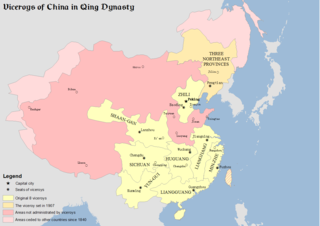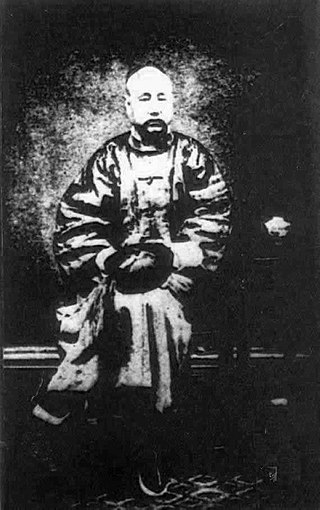| |||||
| Decades: | |||||
|---|---|---|---|---|---|
| See also: | Other events of 1855 History of China • Timeline • Years | ||||
Events from the year 1855 in China .
| |||||
| Decades: | |||||
|---|---|---|---|---|---|
| See also: | Other events of 1855 History of China • Timeline • Years | ||||
Events from the year 1855 in China .

The Taiping Rebellion, also known as the Taiping Civil War or the Taiping Revolution, was a civil war in China between the Manchu-led Qing dynasty and the Hakka-led Taiping Heavenly Kingdom. It lasted from 1850 until the fall of Tianjing in 1864, although the last rebel army was not wiped out until August 1871. The conflict resulted in approximately 20 to 30 million deaths. The established Qing government won decisively, although at great cost to its fiscal and political structure.

The Xianfeng Emperor, also known by his temple name Emperor Wenzong of Qing, personal name Yizhu, was the eighth emperor of the Qing dynasty, and the seventh Qing emperor to rule over China proper, reigned from 1850 to 1861. During his reign, the Qing dynasty experienced several wars and rebellions including the Taiping Rebellion, Nian Rebellion, and Second Opium War. He was the last Chinese emperor to exercise sole power.

The Nian Rebellion was an armed uprising that took place in northern China from 1851 to 1868, contemporaneously with Taiping Rebellion (1851–1864) in South China. The rebellion failed to topple the Qing dynasty, but caused immense economic devastation and loss of life that became major long-term factors in the collapse of the Qing regime in the early 20th century.

Zongdu, usually translated as Viceroy, Head of State or Governor-General, governed one territory or more provinces of China during the Ming and Qing dynasties.

Sengge Rinchen or Senggelinqin was a Mongol nobleman and general who served under the Qing dynasty during the reigns of the Daoguang, Xianfeng and Tongzhi emperors. He is best known for his role at the Battle of Taku Forts and at the Battle of Baliqiao during the Second Opium War and his contributions in helping the Qing Empire suppress the Taiping and Nian rebellions.

The Taiping Heavenly Kingdom (1851–1864) was a Chinese theocratic absolute monarchy which sought to overthrow the Qing dynasty. The Heavenly Kingdom, or Heavenly Dynasty, was led by King Hong Xiuquan and his followers. Its capital was at Tianjing. The unsuccessful war it waged against the Qing is known as the Taiping Rebellion.
The Miao rebellion of 1854–1873, also known as the Qian rebellion was an uprising of ethnic Miao and other groups in Guizhou province during the reign of the Qing dynasty. Despite its name, Robert Jenks estimates that ethnic Miao made up less than half of the uprising's participants. The uprising was preceded by Miao rebellions in 1735–36 and 1795–1806, and was one of many ethnic uprisings sweeping China in the 19th century. The rebellion spanned the Xianfeng and Tongzhi periods of the Qing dynasty, and was eventually suppressed with military force. Estimates place the number of casualties as high as 4.9 million out of a total population of 7 million, though these figures are likely overstated.
Events from the year 1860 in China.
Events from the year 1861 in China.
The Northern Expedition was a failed campaign by the Taiping Heavenly Kingdom against the Qing dynasty during the Taiping Rebellion. Its purpose was to capture Beijing and then complete an encirclement of northern and western China. Launched in May 1853, the Northern Expedition would travel from Jiangsu to Zhili before being destroyed in early 1855.
Bi Xiugu also known as Xiao Baicai and Bi Jinlian (1855-1930) was the main figure of a Cause célèbre in 1870s China known as Yang Niawu and Xiao Baicai.
Events from the year 1857 in China.
Events from the year 1856 in China.
Events from the year 1854 in China.
Events from the year 1853 in China.
Events from the year 1862 in China.
Events from the year 1863 in China.
Events from the year 1865 in China.
Events from the year 1867 in China.